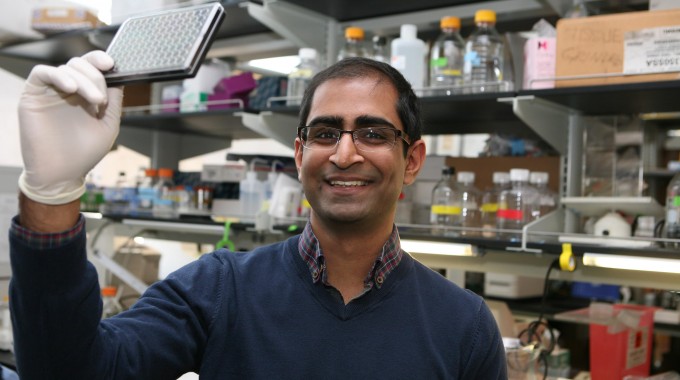If you know of a Columbia College student, faculty member, alumnus/alumna or program we should spotlight, or if you would like to submit a story, please contact:
Columbia College
Office of Communications
cc-comms@columbia.edu

“I wanted to get an inroad into how clinical research is done, especially cancer clinical trials, and, more generally, get a better notion of how cancer patient-doctor interactions work.”
This profile will appear as part of the Summer 2014 Columbia College Today’s Senior Snapshots feature.
Guaranteed research funding made the College an easy choice for Darpan Patel CC ’14. A biology major, he was among the select few admitted to the I.I. Rabi Scholars Program as incoming first-years on the basis of “exceptional promise in the sciences.” As a Rabi Scholar, Patel received stipends and free housing for three summers while he researched cell death mechanisms with Associate Professor of Biological Sciences and Chemistry Brent Stockwell.
Broadly speaking, Patel’s research sought ways to kill cancer cells while avoiding the recurrence of the disease seen with conventional therapies. Most current treatments work by inducing a naturally occurring mechanism known as apoptosis, or programmed cell death. “The problem is that cancers eventually develop resistance to apoptosis,” says Patel, whose experiments involved using small molecules — potential treatments — in attempts to destroy cancer cells through non-apoptotic means.
Each fall, as required by the program, Patel shared his summer work with his fellow scholars at the Rabi Scholars Program Annual Research Symposium. “What I really liked about the Rabi program is that it brought me into contact with people from many disciplines,” says Patel, who received the Bridges and Sturtevant Prize in Biological Sciences, awarded every year to a graduating senior for “highly original and fruitful” research.
In his senior year, Patel worked with Senior Associate Dean of Academic Affairs Hazel May to lay the groundwork for an intergenerational mentoring program for Rabi Scholars. He held biweekly office hours during which he fielded questions from first- and second-year Rabi Scholars about life as an undergraduate researcher. He also gave talks to underclassmen on such topics as scientific writing and finding the right lab to work in. “It’s helpful for them to think about these things early on so they can gauge for themselves whether they are having the best research experience possible,” says Patel, who grew up in Morrisville, N.C.
Patel hopes to make the mentoring program available to all Columbia undergraduate science students. He is working toward that goal by continuing his research in Stockwell’s lab as well as applying to M.D./Ph.D. programs. In the long run, Patel sees himself as a professor of clinical oncology at a research hospital or medical school. Accordingly, once a week during the spring 2014 semester, he volunteered at the Beth Israel Cancer Center, where he evaluated proposals for clinical trials and shadowed doctors. “I wanted to get an inroad into how clinical research is done, especially cancer clinical trials, and, more generally, get a better notion of how cancer patient-doctor interactions work,” says Patel.
Also in his last semester, Patel gave lectures and created study guides as a teaching assistant for “Molecular Biology,” co-taught by James Manley, the Julian Clarence Levi Professor of the Life Sciences, and Jennifer Punt, assistant professor of pathology and cell biology at the Columbia Medical Center. “I learned an astronomical amount during the last semester, just in terms of how differently people think about [scientific] problems and how valuable that is,” Patel says.
Nathalie Alonso CC ’08, from Queens, is a freelance journalist and an editorial producer for LasMayores.com, Major League Baseball’s official Spanish language website. She writes “Student Spotlight” for Columbia College Today.